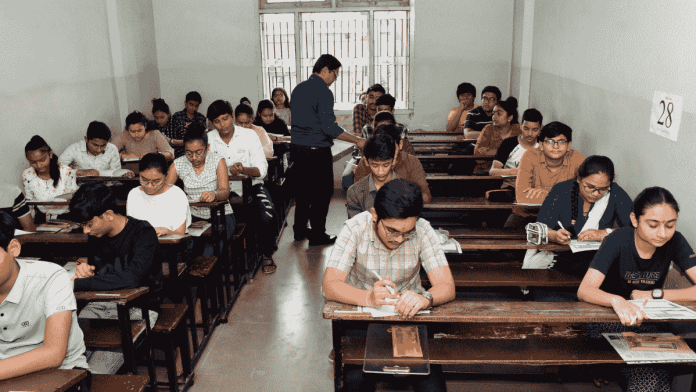New Delhi: English and Mathematics were the two most-studied subjects among students using edtech tools across India, a survey conducted by an education non-profit has found.
In a survey conducted between November 2022 and January 2023, Delhi-based Central Square Foundation found that 84 per cent of respondents used edtechs to study English and 76 per cent used it to study maths. The results of the ‘BaSE: Bharat Survey for EdTech’, which was conducted among 6,030 households covering about 10,000 school-going children in six states, was released Tuesday.
The six states surveyed were Gujarat, Madhya Pradesh, Mizoram, Odisha, Telangana, and Uttar Pradesh, said Shaveta Sharma Kukreja, the chief executive officer and managing director of CSF.
“We timed the survey to coincide with the period after schools were reopened. This was done in order to get the real numbers. Had we held the survey during the lockdown it would have reflected inflated numbers of edtech users,” she said.
The survey found that in urban areas, 88 per cent of students used edtech to study maths and English in comparison to 83 per cent (English) and 71 per cent (maths) in rural areas.
Ease of understanding was the primary reason that students cited for using edtech tools.
The survey used a multi-stage sampling technique — a method that divides the population into groups (or clusters) for research — Kukreja said, adding that it was aimed at understanding user sentiments towards edtechs in rural and urban low-income households to help state and central governments formulate solutions.
Also Read: Focus groups, recovery courses, surveys — how states aim to fix Covid learning loss of kids
Other findings
Of the students surveyed, 51 per cent are current edtech users, 41 per cent had never used technology for learning, and 8 per cent had stopped using it after schools reopened following the Covid lockdown.
Urban households had a higher prevalence of “present users”.
The survey also found that YouTube (89 per cent) was the most popular tool used for online learning, followed by Whatsapp (62 per cent) and Google (52 per cent).
Moreover, while more than half of the respondents (53 per cent) used edtech tools for the easy understanding of difficult concepts, 47 per cent students used it as it enabled self-paced learning and 42 per cent used it to clear their doubts.
As an outcome of increased internet penetration in the country, the survey showed that 85 per cent households reported ownership of at least one smartphone — with nearly one-third of the households owning more than one smartphone.
Urban households showed slightly higher ownership of smartphones as compared to rural households (1.5 as compared to 1.3 smartphones in rural).
The survey also found that fathers, who were the primary breadwinners of the surveyed households, were also the primary owners of a smartphone — 66 per cent of fathers were the primary possessors of smartphones, followed by 36 per cent mothers and 20 per cent of children.
Among the surveyed households that didn’t own a smartphone, 97 per cent of the respondents cited the ‘cost of the device’ as the most primary reason. The survey noted that the average annual income of families that owned a smartphone was INR 1.20 lakh as against Rs 0.81 lakh of families without smartphones.
(Edited by Uttara Ramaswamy)
Also Read: Increased funds for school education budget should address Covid learning loss, say educationists






